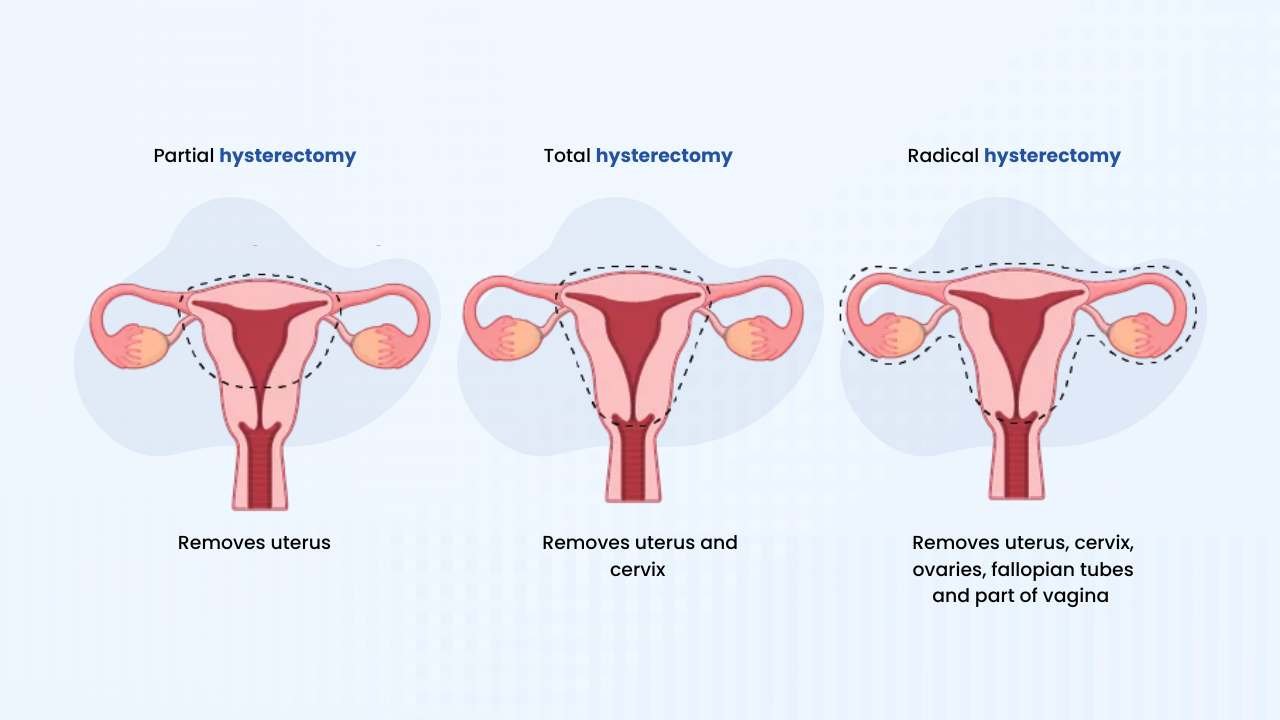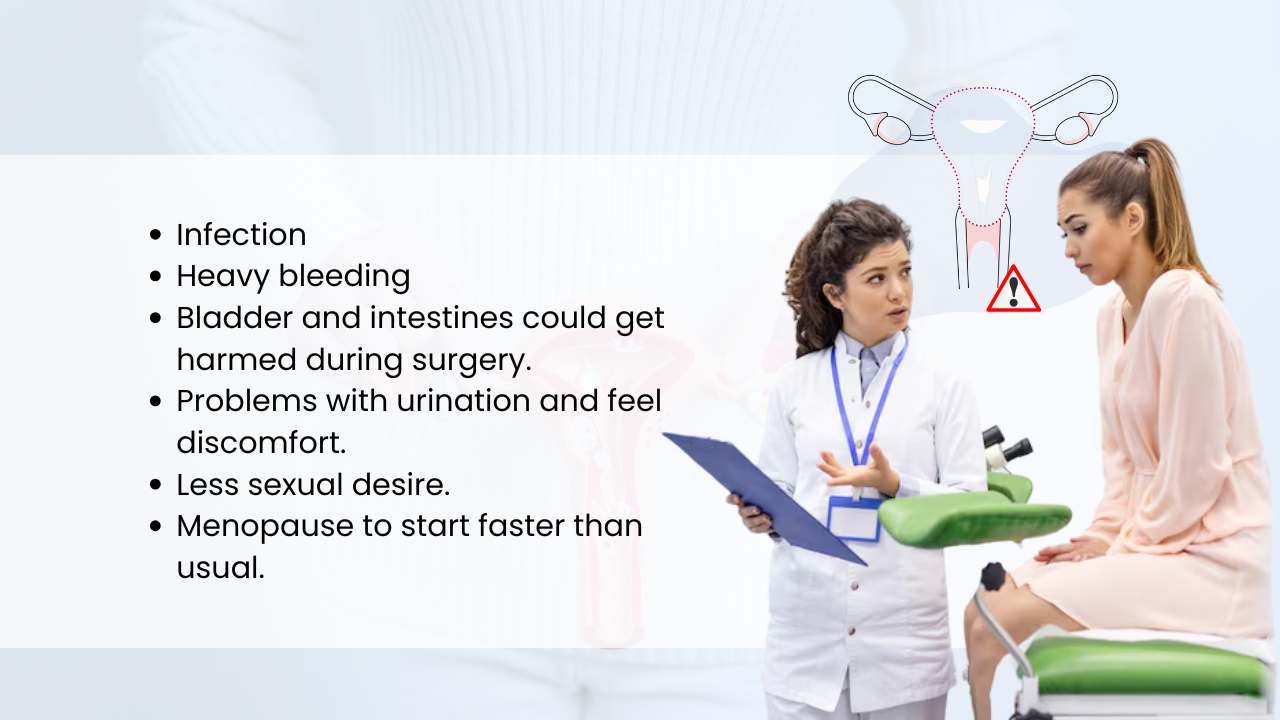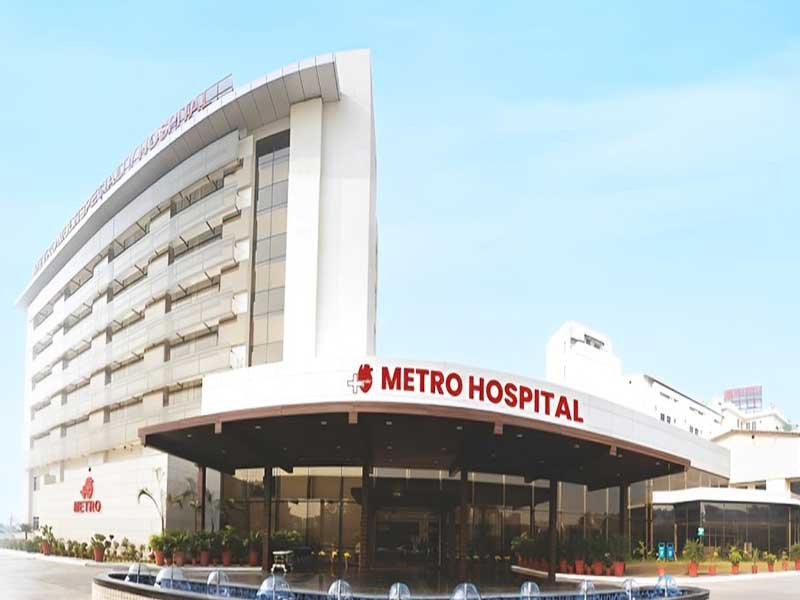Get safe, affordable hysterectomy surgery in India with world-class hospitals, experienced doctors, and end-to-end assistance from a trusted medical tourism provider.
Recovery Time
3 Weeks
Success Rate
98%
Hospital Stay
3-5 Days
Treatment Type
Surgical
Home Treatments Gynecology and Obstetrics Hysterectomy
Looking for low-cost uterus removal surgery in India?
The information given in this article explains the total cost of hysterectomy surgery in India. See how you can save money and still get quality care.
The rise of hysterectomy in Indian hospitals because world-class medical treatments, leading hospitals, and well-experienced gynecologists. The cost of a hysterectomy in India is 3500-5300 USD, much lower than in many other countries. Whether you need a total abdominal hysterectomy, laparoscopic hysterectomy, and vaginal hysterectomy, you can get good care and great results at a lower cost.

Minimum Cost | Maximum Cost | Hospital Stay | India Stay |
3500 USD | 5300 USD | 3-5 days | 3 weeks |
A hysterectomy is a surgical procedure that helps to remove your uterus and your cervix. Also, doctors may remove some nearby parts like the fallopian tubes and ovaries. After this surgery, you won’t be able to get pregnant, and your monthly periods will stop permanently.

Some important factors that impact the overall cost of treatment:
• Pre-operative Tests
Before the surgery, you may need blood tests, an ultrasound, an MRI, and CT scans to check your condition. The cost of these tests is higher than the overall cost of the surgery.
• Type of Surgery
There are different types of hysterectomy surgeries like total abdominal, laparoscopic, and vaginal. Some types need more advanced tools and care, which can make them more expensive.
• Hospital Facilities
Hospitals with modern equipment, better rooms, and advanced care usually charge more than smaller hospitals.
• Doctor’s Fees
A highly experienced surgeon will charge a higher cost as compared to a less experienced surgeon who ensures quality care and successful outcomes.
• Anesthesia and Medicines
You will need anesthesia during the surgery and medicines before and after. These can also increase the total cost.
• Complex Case
If you have other health issues and your case is more complicated, the surgery may need more care and time, which can increase the cost of surgery.
• Hospital Stay Duration
If you stay longer in the hospital, it will increase the overall cost for the room, food, nursing, and other services.
• Care After Surgery
After surgery, you might need follow-up doctor visits, medicines, and even physiotherapy. These impacts cost.
• Other Medical Services
Some hospitals may charge extra for things like pre-surgery tests and post-surgery care. These can add up, so it is helpful to plan for these as part of your overall treatment costs.
Hysterectomy cost
Treatment Name
Estimated Cost
Hysterectomy 3500-5300 USD
The cost of a hysterectomy in India is lower than in Western countries, but the overall cost depends on several factors, such as:
Cost Component | Details | Cost in USD |
Pre-operative Consultation & Diagnosis | Consultations, X-rays, MRI scans, blood tests | 350 USD |
Surgery Costs | Surgeon fees, type of surgery, etc. | 3500-5300 USD |
Rehabilitation and Follow-up | Physiotherapy sessions, medications, supportive devices, and follow-up visits | Variable by Procedure |
Fill in your details and we'll get back to you soonGet Free Treatment Quote
Country | Cost Structure |
India | 3500-5300 USD |
United States | 4500-20000 USD |
Germany | 3000-11614 USD |
Turkey | 2000-8000 USD |
Key Takeaways
✅ Affordable Treatment Cost
Affordable treatment options with experienced gynecologists. Advanced facilities make quality healthcare in India available to international patients.
✅ Advanced Medical Technology
Hospitals in India are equipped with the latest technology and have modern infrastructure and high-quality care, providing international standards at more affordable costs.
India has become a top choice for people from around the world who need medical treatment.
Many patients travel to India because they can get high-quality care at much lower prices than in countries like the United States, Canada, and the UK.
Healthcare in India is much cheaper than in many Western countries, because hospital and doctor fees are lower in India. Patients can save a lot of money by choosing to have their treatment in India, without compromising on quality.
India has many modern hospitals that use the latest medical equipment and follow international standards for safety and care. The doctors and surgeons are well-trained and experienced, and they provide top-quality treatment to patients from all over the world.
Many Indian hospitals use robots for surgeries to make treatment more accurate and less painful. This not only improves the results but also helps keep the treatment affordable.
Yes, hysterectomy is generally a very safe surgery. But like any surgery, some problems can happen, such as fever, heavy bleeding during and after surgery, and breathing problems.
No, not all women have the same risk. Women with other health problems may have a higher chance of complications, especially with anesthesia.

• Partial hysterectomy: In this type of hysterectomy, the upper part of your uterus is removed.
• Total hysterectomy: In this process, your uterus and the cervix are removed.
• Radical hysterectomy: In the radical hysterectomy, the uterus, cervix, tissue around the cervix, and small part of vagina are removed. Usually, it is performed to treat cancer.
• Fibroids
Fibroids are non-cancerous lumps that grow in the uterus, and they are not dangerous, but they can cause problems like heavy bleeding during periods, feeling tired because of blood loss, pain in your lower belly, pain during sex, and pressure on your bladder. Large fibroids might need a different type of surgery, called an abdominal hysterectomy, where the uterus is removed through a cut in your lower belly.
• Endometriosis
This happens when tissue that is lining the inside of the uterus starts to grow outside of it. It can grow on the ovaries, fallopian tubes, and other nearby organs. Most people with this condition have a laparoscopic hysterectomy, which uses a camera through a small cut in your belly. Sometimes, surgery is done using robotic tools and through an abdominal cut.
• Adenomyosis
Adenomyosis starts when the lining of your uterus grows into the wall of the uterus and makes your uterus larger, which can cause heavy and painful periods. It often goes away after menopause. If not, a hysterectomy may be needed.
• Gynecologic Cancer
A hysterectomy may be done for cancer in your uterus, cervix, endometrium, and ovaries, and also for precancerous changes.
• Uterine Prolapse
It happens when the uterus descends into the vaginal canal because of weak pelvic floor muscles and its supporting tissues. However, this condition leads to various symptoms such as pressure in the pelvis, pelvic pain, and a lump in the vagina.
• Chronic Pelvic Pain
If the uterus is the cause of long-term pain and other treatments don’t help, a hysterectomy may be an option.
Here are the benefits of a hysterectomy:
• Pelvic Exam and Pap Smear
These tests check the health of your cervix and uterus, and they can help find early signs of problems like cervical cancer.
• Endometrial Biopsy
This test helps check for cancer and other unusual changes, and it is taken from the lining of your uterus.
• Pelvic Ultrasound
This helps doctors see things like fibroids, cysts, and other problems.
• Blood Tests
These tests check for issues like anemia, infections, and swelling in your body to make sure you are healthy for surgery.
• MRI and CT Scan
MRI scans may use them to look more closely at growths like fibroids to see their size and where they are.
Dos and Don’ts Before a Hysterectomy
Do’s
🟢 You should carefully follow your doctor’s pre-surgery instructions, such as fasting, adjusting medications, and completing any required tests.
🟢 Arrange for help at home, especially for the first few days, and set up a comfortable resting area.
Don'ts
🔴 You should follow prescribed medications carefully, including antibiotics and pain management drugs, and consult before stopping any.
🔴 Avoid smoking and alcohol for a few weeks before and after surgery, because they can slow down recovery.
🔴 Report any unusual pain, fever, or swelling to your doctor promptly to prevent complications.
Your doctor will decide what kind of hysterectomy you need and the best way to do the surgery.
An anesthesiologist will give you one of these types of anesthesia:
Surgery is done depending on things like your health, the size of your uterus, the reason for the surgery, the surgeon’s experience, and your preference.
Vaginal hysterectomy is the process that helps to remove the uterus through a small cut of your vagina.
The surgeon uses a thin tube with a laparoscope, and small tools through tiny cuts in your belly and vagina to remove the uterus.
In a robotic hysterectomy, the surgeon makes a small cut through robotic arms in your lower abdomen.
Abdominal hysterectomy helps to remove the uterus through a larger cut in your lower abdomen. It takes longer to recover, but it may be needed for certain medical reasons.
The type of surgery can affect the type of anesthesia used, how long recovery takes, how much pain you feel after surgery, and if you have long-lasting pain.
‣ Better Quality of Life
You should feel better after the surgery, and the pain and bleeding you had before should stop.
‣ Menopause Symptoms
You will no longer have periods. If your ovaries were removed, you might have menopause symptoms like hot flashes. If your ovaries were not removed, these symptoms may not happen right away.
‣ Changes in Sex Life
Some people have vaginal dryness and less interest in sex, especially if their ovaries were removed. But many feel their sex life is better because there is no more pain and heavy bleeding.
Follow your doctor’s instructions, get proper rest, but try to walk a little each day. Slowly increase how far you walk. Don’t lift anything heavy until your doctor says it’s okay. Don’t put anything in your vagina for the first 6 weeks like tampons, douching, and sex. Even after you recover, keep seeing your gynecologist for regular checkups.

A hysterectomy is a surgery to remove the uterus, and like any surgery, it can have some risks:
After surgery, you may need to stay in the hospital for 3-5 days.
After a hysterectomy, recovery will take 3 weeks.
The success rate of hysterectomy in India is 98%.
Indian doctors are highly experienced and renowned for their expertise in procedures like hysterectomy. Many of them are internationally trained and have received awards for their exceptional work.
These hospitals are accredited by international bodies like JCI and NABH, ensuring they meet international standards. They are equipped with the latest advancements to give better outcomes for patients.
Beds: 539
New Delhi
Beds: 230
New Delhi
Beds: 710
New Delhi
Beds: 650
New Delhi
Beds: 191
New Delhi
Beds: 310
New Delhi
Beds: 299
Gurugram
Beds: 380
New Delhi
Beds: 402
New Delhi
Beds: 1300+
Gurugram
Beds: 1000
New Delhi
Beds: 450
Faridabad
Beds: 675
New Delhi
Beds: 500
New Delhi
Beds: 400+
Faridabad

Max Super Speciality Hospital, Saket

Aakash Healthcare Super Speciality Hospital

Indraprastha Apollo Hospital

BLK Max Super Speciality Hospital

Dharamshila Narayana Superspeciality Hospital

Fortis Escorts Heart Institute

Fortis Memorial Research Institute

Manipal Hospital Dwarka

Max Super Speciality Hospital Shalimar Bagh

Medanta - The Medicity Hospital

Moolchand Kharaiti Ram Hospital

Sarvodaya Hospital

Sir Ganga Ram Hospital

Venkateshwar Hospital

Metro Heart Institute with Multispecialty
• Team of Top Gynecologists
Our recommended doctors have over 20 years of experience in performing reproductive health procedures. This experience ensures that you are in expert hands, receiving high-quality care for your health needs.
• JCI/NABH Accredited Hospitals
We partner with hospitals that are accredited by organizations like JCI and NABH. These hospitals have advanced facilities and the newest technologies, such as robotics, machine learning, and advanced diagnostic and therapeutic equipment, which gives complete and specialized care.
• Other Benefits
Mejocare provides quick, detailed responses, exact cost estimates, and assistance with obtaining medical visas and accommodation arrangements in India.
Moreover, we help with your appointment scheduling and provide smooth arrival services, including airport pickup, hotel transfers, and full support during your healthcare journey.
Getting a hysterectomy can bring up a lot of emotions. It may give you relief from pain and health problems, but it can also be a tough time, both physically and emotionally. Some people feel sad and also experience a sense of loss after the surgery. That is completely normal.
Disclaimer
The information provided above is only for general purposes; it doesn’t aim to give you an accurate cost estimate. If you are seeking professional opinions and exact cost information, we can help you connect with India’s top surgeons. Contact Mejocare now.

Medically Reviewed By
QualificationsMBBS, DTMU University, Georgia,Radiation Oncology Resident at Burdwan Medical College and HospitalDr. Aryan Malhotra is a skilled and caring doctor. He is a Radiation Oncology Resident at Burdwan Medical College and Hospital. He treats people with cancer and works closely with patients during their treatment.He completed his MBBS from David Tvildiani Medical University in Georgia. He has passed the USMLE... Read More
The average cost of a Hysterectomy in India is between 3500-5300 USD.
The success rate of Hysterectomy in India is around 98%.
You have to stay in the hospital for 3-5 days.
After this operation, most women return home after 2-3 days, but it usually takes six to eight weeks for full recovery. You need to take some time off at home during this period. Before speaking with your doctor about limitations, you shouldn't perform any chores. For the first two weeks, avoid any lifting. But no hard lifting; walking is encouraged. You can resume your normal activities six weeks later. If you feel down, anxious, or are having a hard time adjusting to the physical changes in your body, ask your spouse, family, friends, or a counselor for emotional support.
The possible risks are Bleeding, Pain and swelling, Infection, Damage to the urinary tract or other pelvic organs, Blood clots, and Hormonal changes.
Yes, it is necessary to have a companion.
Avoid traveling for at least four weeks after surgery.
Yes, you can do your own research and choose your therapist
You can use Paracetamol regularly to manage mild to moderate pain. Moderate pain can be managed using non-steroidal anti-inflammatory drugs (NSAIDs) like diclofenac or ibuprofen.
Yes, insurance will cover the cost of Hysterectomy in India.
To discover the top doctors or hospitals in India, you can visit our website, mejocare on the doctors' page, you can filter and find the finest doctors, while on the hospital page, you can identify the best hospitals. Additionally, you can reach out to us, and we will gladly offer you all the necessary suggestions and information you need.
The procedure lasts one to three hours.
No, there is no waiting list for Hysterectomy in India.
Yes, you will likely need to undergo tests such as Blood Test, Urine test, Pelvic exam, Pap smear, Ultrasound, and Biopsy.
Neuraxial anesthesia in the form of a spinal block or epidural is an option for some vaginal and abdominal hysterectomies. This regional anesthesia numbs your body from your abdomen to your toes. Sedation can be provided as needed for patient comfort, including deep sedation so you remain unaware during surgery.
Within six weeks of the surgery, you ought to be ready to resume your normal activities. You should avoid heavy lifting, strenuous exercise, and sex for up to six to eight weeks after your surgery, or until your doctor gives you clearance.
Hysterectomy can have various effects on the body, such as hormonal changes, weight gain, and increased risk of osteoporosis. Therefore, it is important to follow a healthy diet plan after a hysterectomy to promote healing and prevent complications.
Aftercare services provided by the hospital include Monitoring vitals, Wound care, Managing post-operative complications, Rehabilitation Services, and Follow-up.
Our care team can help you.
